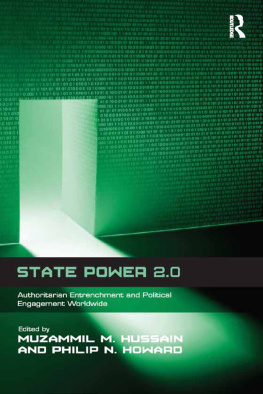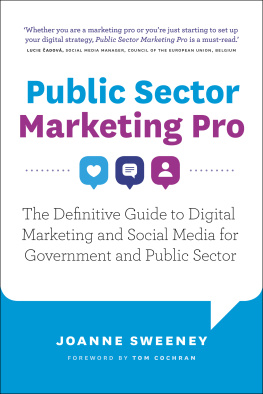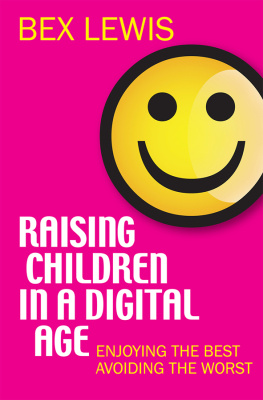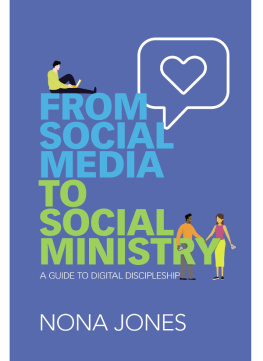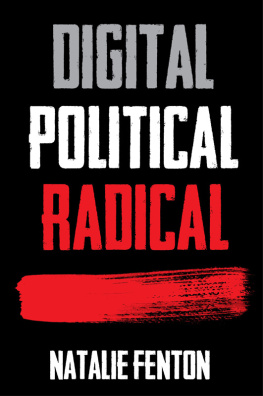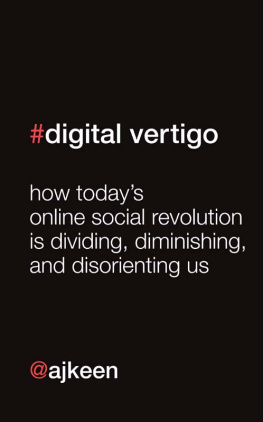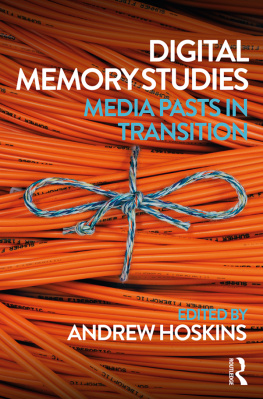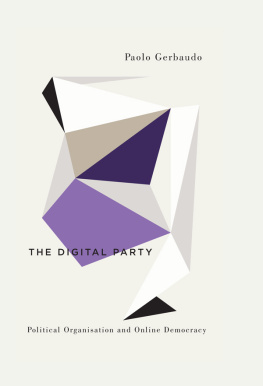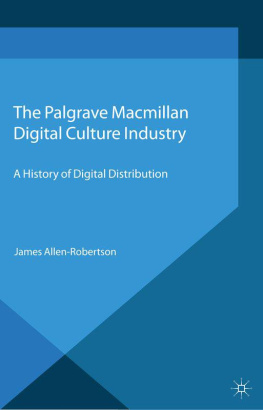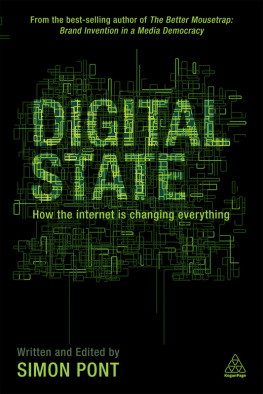First published 2013 by Ashgate Publishing
Published 2016 by Routledge
2 Park Squre, Milton Park, Abingdon, Oxon OX14 4RN
711 Third Avenue, New York, NY 10017, USA
Routledge is an imprint of the Taylor & Francis Group, an informa business
Copyright Muzammil M. Hussain and Philip N. Howard 2013
Muzammil M. Hussain and Philip N. Howard have asserted their right under the Copyright, Designs and Patents Act, 1988, to be identified as the editors of this work.
All rights reserved. No part of this book may be reprinted or reproduced or utilised in any form or by any electronic, mechanical, or other means, now known or hereafter invented, including photocopying and recording, or in any information storage or retrieval system, without permission in writing from the publishers.
Notice:
Product or corporate names may be trademarks or registered trademarks, and are used only for identification and explanation without intent to infringe.
British Library Cataloguing in Publication Data
A catalogue record for this book is available from the British Library
The Library of Congress has cataloged the printed edition as follows:
Howard, Philip N.
State Power 2.0 : Authoritarian Entrenchment and Political Engagement Worldwide / by Philip N. Howard and Muzammil M. Hussain.
pages cm
Includes bibliographical references and index.
ISBN 978-1-4094-5469-4 (hardback)
1. Internet--Political aspects. 2. Internet--Government policy. 3. Internet--Censorship. 4. Authoritarianism. 5. Social control. I. Hussain, Muzammil M. II. Title.
HM851.H69 2013
303.3'3--dc23
2013020296
ISBN 9781409454694 (hbk)
Notes on Contributors
Sheetal D. Agarwal is a doctoral candidate in the Department of Communication at the University of Washington, Seattle. Her research interests include the intersection of media, technology, and politics from a network perspective. Currently, she is evaluating the role of values, resources, and power distribution in technology development within networked organizations.
Fahed Al-Sumait is Assistant Professor and Department Chair of Communication at the Gulf University for Science and Technology in Kuwait. He was recently a post-doctoral research fellow at the National University of Singapores Middle East Institute, and a Fulbright-Hays fellow from 20102011.
Gregory Asmolov is a doctoral student in the Media and Communications Department, at the London School of Economics and Political Science. He is a co-founder of HelpMap, a crowdsourcing platform which was used to coordinate assistance to victims of wildfires in Russia in 2010.
Jessica L. Beyer is a post-doctoral scholar in the Henry M. Jackson School for International Studies at the University of Washington, Seattle.
Matthew Carrieri is a researcher at the Citizen Lab, Munk School of Global Affairs, University of Toronto. He holds a BA in Middle East Studies from McGill University and an MA in Near Eastern Studies from New York University.
Ronald J. Deibert is Professor of Political Science and Director of the Canada Centre for Global Security Studies and the Citizen Lab at the Munk School of Global Affairs, University of Toronto.
David M. Faris is Assistant Professor of Political Science and Director of International Studies at Roosevelt University. He is author of Dissent and Revolution in a Digital Age: Social Media, Blogging and Activism in Egypt (I.B. Tauris).
Philip N. Howard is Professor of Communication, Information and International Studies at the University of Washington, Professor of Public Policy at the Central European University, and a fellow at the Center for Information Technology Policy at Princeton University.
Muzammil M. Hussain is Assistant Professor in International and Comparative Media Studies at the University of Michigans Department of Communication Studies, Faculty Associate at the Institute for Social Researchs Center for Political Studies, and directs the project on Comparative Digital Politics and Democratization (www.comparative-DPD.org).
Mohammed Ibahrine is Assistant Professor of Digital Advertising and Marketing Communication at the American University of Sharjah, UAE. He is a contributing member of the Open Society Global Project Mapping Digital Media and the ITU Global Cybersecurity Agenda (GCA).
David Karpf is Assistant Professor of Media and Public Affairs at the George Washington University. His primary research focus concerns online politics in the United States, and is the author of The MoveOn Effect: The Unexpected Transformation of American Political Advocacy (Oxford University Press).
Saad Omar Khan is a researcher at the Citizen Lab, Munk School of Global affairs, University of Toronto. He holds a masters degree from the London School of Economics, and completed his undergraduate studies at the University of Toronto.
Steven Livingston is Professor of Media and Public Affairs, and International Affairs at the George Washington University.
Katherine Maher is Director of Strategy and Engagement for the international digital rights organization Access, and a fellow at the Truman National Security Project.
Catherine McKinley began her career as a reporter with the BBC World Service in London before moving to Shanghai and then Hanoi as Dow Jones Newswires Bureau Chief for Vietnam. She later transitioned to media development consultancy, focusing on media skills, ethics, policy and legal reform and coordination between the international donors supporting media development in Vietnam. She also conducts research on the role of the media in combating corruption.
Babak Rahimi is Associate Professor of Communication, Culture and Religion at the Program for the Study of Religion, Department of Literature, University of California, San Diego.
Imad Salamey is Associate Professor of Political Science and International Affairs at the Lebanese American University in Beirut. He is President of the Center for Arab Research and Development (CARD), and Executive Board Member of the Institute for the Study of Conflict, Security and Development (CSDS) at Richmond American International University in London.

